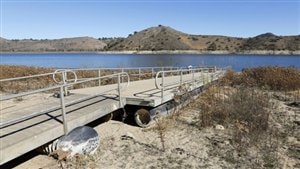Your hosts this week, wojteck Gwiazda, and Marc Montgomery. Lynn is off for the Easter Good Friday holiday.
Listen
The Intergovernmental Panel on Climate Change (IPCC) recently came out with its most strongly worded statement yet about the effects of man-made global warming.
Along with that, renowned scientists from around the world say countries must act now to reduce greenhouse gas effects.to mitigate those effects which are already beginning to be felt in areas around the world with more and more unpredictable climate and often devastating weather anomalies.
In Canada, the David Suzuki Foundation, and environmental awareness group, says this country must get on board a green-energy revolution.
Lynn spoke with Ian Bruce, the science and policy manager with the foundation.

Meanwhile, in a similarly related story this week, a new study has stirred up more debate on the issue of global warming.
A Canadian scientist says almost all studies so far have explored just one of the two major and conflicting hypotheses regarding the sudden increase of global temperatures in the historically brief period of time since the industrial age began just over 100 years ago.
The two arguments are basically, man is responsible, or that its natural variation.
Shaun Lovejoy (PhD) of McGill university says he set out to explore the natural cause hypothesis as that aspect has been very little explored,
After studying the records, he says such a dramatic temperature increase in such as short time is virtually unheard of historically and so the hypothesis of natural causes can be discounted with a very high degree of certainty.
This week Wojtek speaks to a First Nations Chief as a follow-up to a story last week.

It concerns a federal government proposal regarding new monies and control over education for aboriginal peoples in this country.
Grand Chief Michael Delisle, a Mohawk from the community of Khanawake, says the legislation will not improve aboriginal control over education.
He also disputes claims that First Nations have been consulted on the proposed legislation, saying no-one from the government consulted with his community, which he says already has a very successful education system.
Delisle says First Nations are becoming angry about the proposed legislation, but will not predict what action might be taken if the legislation proceeds







For reasons beyond our control, and for an undetermined period of time, our comment section is now closed. However, our social networks remain open to your contributions.